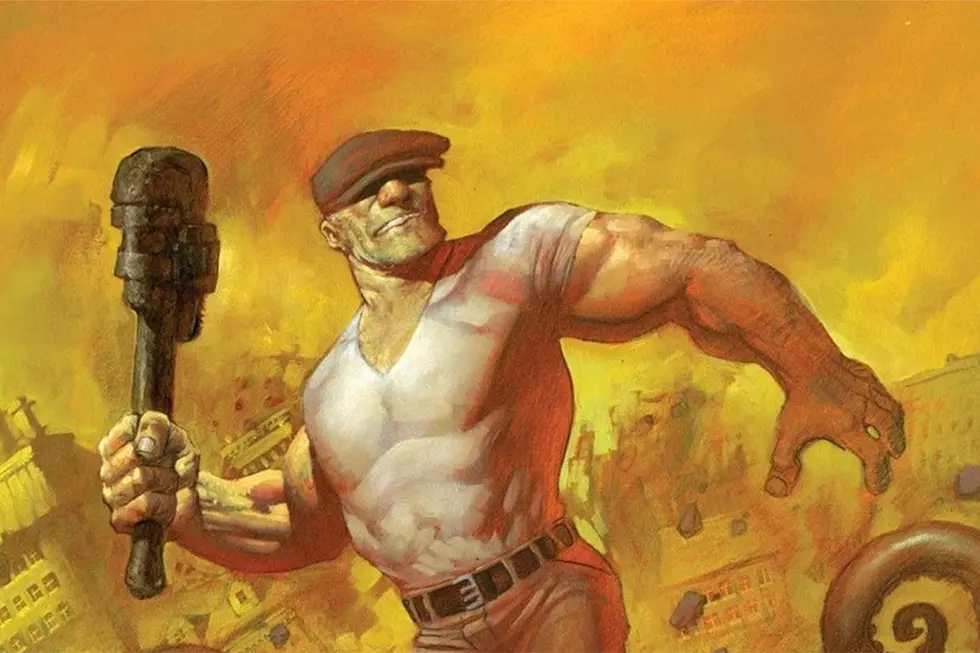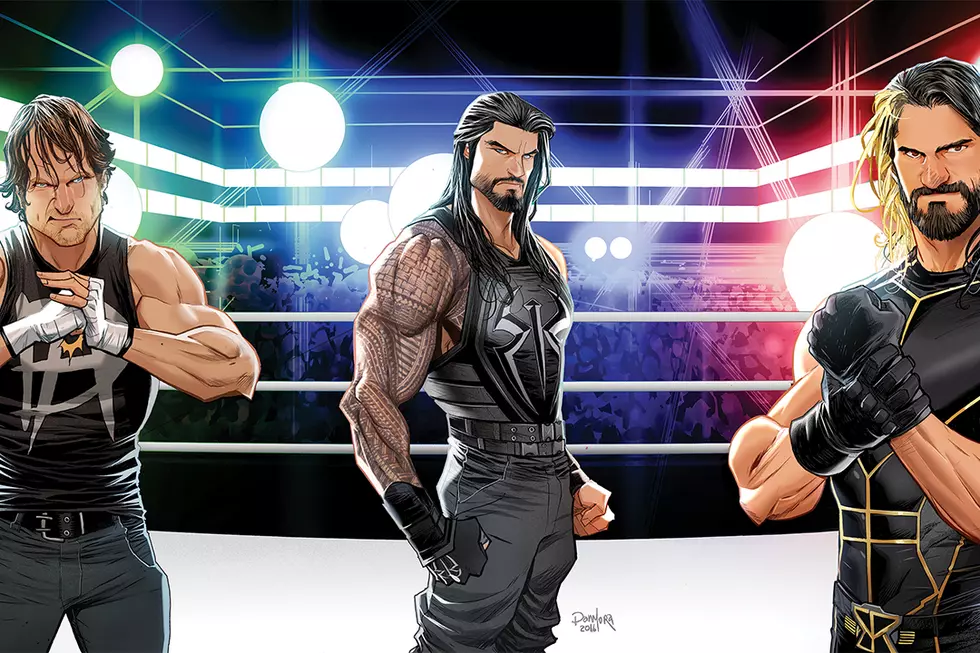![ComicsAlliance Reacts to Eric Powell’s ‘Creators Front for Diversity in Comics’ [Video]](http://townsquare.media/site/622/files/2011/01/untitled-1-1296527692.jpg?w=980&q=75)
ComicsAlliance Reacts to Eric Powell’s ‘Creators Front for Diversity in Comics’ [Video]

The Eisner award-winning creator of The Goon, Eric Powell released over the weekend a short film promoting The Creators Front for Diversity in Comics, a new campaign for activism in support of creator-owned comics. The movement is targeted at the readers, creators and publishers of Marvel and DC superhero comics, whom Powell characterizes satirically as suborning or participating in the brutal abuse of professionals whose critically acclaimed, creator-owned works are not feeding their families. The video has proven divisive: stated sales figures seem somewhat dubious; the nature of the direct market is not discussed; and the clip's depiction of a cartoonist's sexual abuse at the hands of a corporate superhero (at the behest of a vicious fictional superhero comics editor played by Robert Kirkman someone who looks like Robert Kirkman who is not Robert Kirkman) has prompted many to dismiss the Goon creator's statement outright.
No matter how you look at it, there's a lot of food for thought in the Creators Front for Diversity in Comics video. Below you will find the complete film -- which may not be safe for work due to the simulated sex acts -- as well as reactions from the ComicsAlliance staff.
The ferociousness with which Powell attacks the superhero business and its audience is tempered by the video's obviously satirical presentation, but the sentiment is made plainer and harsher in the clip's YouTube description, which we republish here unedited:
No other entertainment industry is sustained from one genre and 50 year old material. The comic book industry is living off of decades old company owned super hero titles while shoving new original content to the side. The result is the industry has slowly been losing readers for years and alienates anyone who is not interested in reading books about guys in tights.
It's time to change. Support original creator owned comics and diversified content.
Comics... they aren't just for guys that live with there mom and have never felt the inside of a vagina.
The Creators Front Facebook page addresses comic book writers and artists directly, saying, "Don't spend your life making someone else's dreams."
The members of Team ComicsAlliance all came away from Powell's film with fairly varied reactions. Many of us observed that the Creators Front video seemed to ignore the prevailing question facing the entire comics industry, how to expand the customer base beyond direct market comic book stores? Others expressed concerns about Powell's characterization of sales figures, and some of us took issue with the film's tone and use of violent imagery to make its point.
(Editor-in-Chief Laura Hudson is on vacation and, per her instructions to be left alone else suffer exquisite pain and a month of answering PR emails, could not be reached for comment.)
ComicsAlliance Senior Editor Caleb Goellner
While spirited and well-meaning, Powell's call-to-action comes off as more than a little patronizing in a culture that extends beyond the direct market. Manga fans, webcomics readers, the cape crowd and more constitute an increasingly overlapping readership that supports comics content from a number of sources - many of which aren't superhero publishers.
Insinuating that superhero publishers are content gatekeepers holding creators back from their passions is counterproductive. There's an ever-growing number of folks already publishing and promoting their own work to receptive audiences online. These creators may not always monetize these efforts as effectively as a conventional publisher, but they carry on with their heads and hearts in the right place, not out of naivety or a sense of entitlement.
Company-owned superhero comics remain the most traditional and reliable way for creators to make a living given their existing niche marketplace, but there's an upside to the reliable revenue stream. After all, many creators essentially fund their creator-owned work with superhero paychecks. Until relatively recently, Marvel and DC were pretty much Kickstarter for pros with passion projects.
A handful of publishers may have a hold on the industry in the direct market, but it's not a stranglehold. Comic creators who work outside of the brick-and-mortar mentality have all the tools they need to successfully publish and promote their own creator-owned material to savvy readers. If Powell could've shook the An Inconvenient Truth schtick, his intended message would have shone through without making a lot of smart folks in the comic book community roll their eyes.
ComicsAlliance Site Operations Manager Brian Childs
Not to undermine Eric Powell's point on the importance of original creator-owned comics, but I think that as things move digital this is going to become less of a problem. In David Brothers' post on who is buying digital comics, he points out, "the Top Ten Series [of the year] on ComiXology reveals ... creator-owned books are 50% of the list." This is a bit misleading because it doesn't include all the data. For example, it excludes sales through Marvel's company app, but it definitely indicates that creator-owned independent books are benefiting from this new distribution model. The data Powell points out overlooks the graphic novel/trade paperback sales as well, which in 2010 were dominated by Walking Dead, Scott Pilgrim, Fables, Chew, and Unwritten, with appearences by Y the Last Man, Serenity Shepards Tale and Preacher.
Also, I know everyone pretends that it doesn't exist, but Archie might be the most-read comic in America. Archie Comics had 1.7 million downloads of their app last year; three HUGE event stories with introduction of Kevin Keller, their first gay character, an Obama/Palin issue and the "Archie Marries..." storyline -- which I thought was one of the best comics of the last year. My point being, they don't have superheroes.
Lastly, the data Powell cites excludes digital comics strips. SMBC, Oglaf, Sinfest, Girl Genius, Menage a 3, Girls with Slingshots, Buttersafe, Nedroid, Dr. McNinja, Hark! A Vagrant, XKCD, Cyanide and Happiness, and Penny Arcade are, I believe, all creator-owned and probably sustain the artists.
It is tough out there to be a comic creator, no one is challenging that, but Eric Powell isn't really giving the full picture in his video.

ComicsAlliance Associate Editor Andy Khouri
Eric Powell is a brilliant cartoonist and The Goon is an uncommonly excellent comic book, but I don't think it's helpful to admonish the hardcore Wednesday crowd for not buying more creator-owned comics. Certainly, we wish they would buy more creator-owned books and that more creators could make a living on their critically acclaimed material. But remember, there is a fairly massive network of comic book hype targeted at the Wednesday crowd in the form of activist retailers, websites like ComicsAlliance, publisher initiatives, etc. that absolutely includes smaller press and creator-owned material in addition to DC/Marvel/licensed properties, and there has been for some time. For the most part, the Wednesday crowd is aware of this material. Maybe one of our retailer readers can confirm this for sure, but my suspicion is that any direct market customers who are inclined to read The Goon, for example, are already reading it, and that the same is true for many creator-owned titles.
If you want to talk about opening creator-owned comics up to an audience beyond direct market comic book stores, that's awesome and we have seen how creators like Chris Ware have benefited when that happens, but that's not what Powell is talking about here. Powell, who drew three issues of Geoff Johns-written Action Comics, immediately sets up an "us vs. them" scenario that I think probably went out of fashion when the old Warren Ellis Forum closed down. I think that approach is taking away from -- and potentially derailing -- the more positive creator-owned activism recently promoted by people like Steve Niles, whose mission is to simply advocate for those books whenever the opportunity presents itself, and not at the expense of anyone else's tastes or by mocking their livelihoods.

ComicsAlliance Senior Writer Chris Sims
I think Powell's being a little disingenuous by insinuating that it's impossible for great creators to do great work on corporate comics. That's just patently untrue -- look at Matt Fraction at Marvel or Grant Morrison at DC -- but I think he's exaggerating for humor. It's only a slight exaggeration, though, and he's not wrong. As a reader, a fan, and a retailer, I was continually frustrated with how little the industry -- publishers, distribution, or fans -- allows for new things, instead funneling all its energy into either monopolies like Diamond or near-monopolies like the dominance of super-heroes as a genere or the overwhelming market share of exactly two companies.
I mean, I'm a super-hero guy. I love Marvel and DC super-heroes, and I'm passionate about them, and I think there's a lot to be gained from working on those characters and adding to a mythology that's been created and refined over decades. And even at those companies, you're getting things like iZombie, which is a creator-owned title that got a major push from a major publisher, and the remastered Casanova at Marvel. But for some people -- people on every level of the industry -- super-heroes are all there is, and that keeps great things from happening, or getting the audience that they deserve. It's why the Web and digital distribution are so important for creators who want to control what they put out and do the comics that reflect their visions. I mean, really, do you think the mainstream comics industry as it stands would've given us Achewood, Hark! A Vagrant, Dr. McNinja or Axe Cop?

ComicsAlliance Blogger David Uzumeri
The one thing this video achieved was making me not want to read Eric Powell comics. I understand what he's trying to do here, but the fact of the matter is this: creating a PSA to attempt to sway peoples' entertainment consumer habits where you dress things up like a political movement always has, and always will, make you look like a douche.
Aside from his mystifying statement that there were no creator-owned books in last year's Top 500 - unless he's counting Kick-Ass and American Vampire as DC/Marvel titles since they're published by those companies - there's also a huge amount of entitlement on display. Something should be the #1 best-selling book, but it isn't, so the industry is at fault! He's also misleading people by using Direct Market figures, since he essentially completely ignores the fact that creator-owned titles sell better in trade form, especially outside of the DM. How can you say that creator-owned comics aren't top-selling in a world with Scott Pilgrim and The Walking Dead?
The whole thing is compounded by an adolescent, screw-the-man view towards corporate involvement, running off of the assumption that basically anything corporations do or want to do is aimed towards screwing whatever you want over. In short, don't go to Toys 'R' Us and complain that they aren't placing enough focus on selling Settlers of Catan. You want to know the REAL reason why nobody wants your comic, Fictional Writer in the Video? Because everyone else in the entire industry is pitching yet another miniseries involving gothic steampunk manga-infused horror with zombies or whatever the hell genre gangbang you want to write.

ComicsAlliance Blogger David Brothers
The call to arms from Eric Powell (and Steve Niles) is interesting, but I don't know that it isn't anything we haven't heard before. It puts me in mind of Warren Ellis's tired old saw about nurse comics, the days of Savant magazine where writers like Matt Fraction demanded that superheroes give way to a different kind of mainstream or else, and every other movement toward creator-owned comics ever. This latest statement is making the same mistake every other one has by looking at the Direct Market as the totality of the potential comics reading audience.
That's stupid. Marvel and DC run the DM, and they probably always will. The Direct Market audience has been cultivated by the Big Two and trained to expect certain types of books. They don't want creator-owned comics. They want corporate comics, preferably with capes. The audience grew up with capes, they want capes, and there's really nothing you can do about that. They aren't going to budge until either someone goes out of business or there is a tremendous seismic shift in how people consume comics in the DM.
Stop trying to sell comics to the DM. The DM doesn't want them. I think it's sad, but whatever. People will like what they like. Instead of trying to convince people who don't care about you, try to sell to people who don't need tights and fights. Someone out there is willing to read and pay cash money for your books. Find them. Start selling comics to my mom instead of paying so much attention to the Wednesday comics crowd. It worked for Chris Ware, Alison Bechdel, and Jeff Smith.

ComicsAlliance Blogger David Wolkin
There is clearly an important discussion to be had about the economic challenges faced by creators today who don't wish to sacrifice their artistic independence by "selling out" to the Big Two. It's also pretty clear to me that there are better way to start that conversation than with a rape joke. I don't think Powell and his colleagues should expect to be taken seriously if that's how they wish to present their case.
The other thing that strikes me is that they don't really make it clear why we should be supporting creator-owned work other than the fact it benefits a certain group of people. While I obviously want to see talented creators be able to support themselves from their work, this video seems a lot like me walking into my boss's office tomorrow and saying "Give me a raise, BECAUSE."
Also, is it inappropriate for me to say that most people have to make sacrifices to pursue their dreams and support their families? Because that's basically how the world works, even if you're one of the lucky ones.
ComicsAlliance Readers
Now it's your turn. What's your reaction to the Creators Front for Diversity in Comics video? Do you agree or disagree with the CA staff? We'd very much like to read your thoughts, so please leave your comments below.
More From ComicsAlliance




![Miao Yin Finally Gets The Chance To Kick Ass In ‘Big Trouble In Little China’ #6 [Preview]](http://townsquare.media/site/622/files/2014/11/BT00.jpg?w=980&q=75)
![Groo, Goon, And Horror For All Ages In Dark Horse’s NYCC 2014 Announcements [NYCC]](http://townsquare.media/site/622/files/2014/10/GrooMain.jpg?w=980&q=75)

![War Rocket Ajax Early Edition: Big Trouble In Little China, Nailbiter, Afterlife With Archie [Podcast]](http://townsquare.media/site/622/files/2014/06/War-Rocket-Ajax-Early-Edition-Batman-Superior-Spider-Man-and-The-Auteur-main-1.jpg?w=980&q=75)

